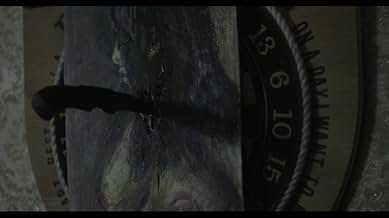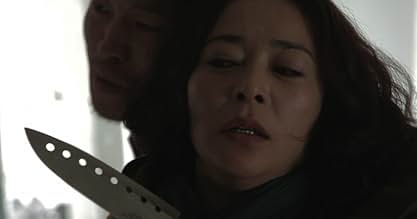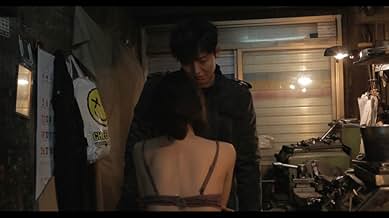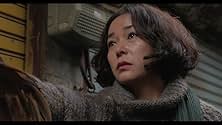A loan shark is forced to reconsider his violent lifestyle after the arrival of a mysterious woman claiming to be his long-lost mother.A loan shark is forced to reconsider his violent lifestyle after the arrival of a mysterious woman claiming to be his long-lost mother.A loan shark is forced to reconsider his violent lifestyle after the arrival of a mysterious woman claiming to be his long-lost mother.
- Awards
- 25 wins & 30 nominations total
Lee Jung-Jin
- Gang-Do
- (as Jeong-jin Lee)
Woo Ki-hong
- Hoon-chul
- (as Ki-Hong Woo)
Cho Jae-ryong
- Tae-seung
- (as Jae-ryong Cho)
Heo Joon-seok
- Suicidal Man
- (as Jun-seok Heo)
Yu Ha-bok
- Container man
- (as Ha-bok Yu)
- Director
- Writer
- All cast & crew
- Production, box office & more at IMDbPro
Featured reviews
Korean thriller movies always surpries me with it's ending. We get through one concept and it turns to be another. While I was watching this, I thought it is a story of mother and son who were somehow separated. But the movie proves me wrong. Its not about the separation and reunion of mother son its about untold revenge.
Pieta is the story of revenge in a most brutal way possible by giving one's own life, a story of mother's love for his son. Story tells us the extreme measures taken by a mother to take the revenge from a non-human brutal loan shark.
Jung-Jin Lee is living a lonely life whose sole purpose is to recover the loan from other people by making them cripple and claiming their insurance money. In doing so he has become so cold inside that he feels nothing and know no pain. Brutality is the everyday life matter.
Enters a woman stirring everything by claiming that she is his mother. she make him feel love, make him angry and make him feel pain just to take the revenge of her son. And when Jung-Jin starts to feel human again, she inflicted the deep scar into his soul by giving her own life.
Movie is full of disturbing content and makes for a haunting viewing. I am a fan of south Korean cinema and this movie takes the love affair to another level.
8/10
Jung-Jin Lee is living a lonely life whose sole purpose is to recover the loan from other people by making them cripple and claiming their insurance money. In doing so he has become so cold inside that he feels nothing and know no pain. Brutality is the everyday life matter.
Enters a woman stirring everything by claiming that she is his mother. she make him feel love, make him angry and make him feel pain just to take the revenge of her son. And when Jung-Jin starts to feel human again, she inflicted the deep scar into his soul by giving her own life.
Movie is full of disturbing content and makes for a haunting viewing. I am a fan of south Korean cinema and this movie takes the love affair to another level.
8/10
The very last scene of this movie would linger in your mind for quite a while. In Kim Ki-Duk's movies, you may find holes in storyline or awkwardness in acting. However, Kim never fails to give stunning visual images via which you could fly to another world in an instant.
In my opinion, elaborate scenarios or experienced actors/actresses are not prerequisite for Kim's movies. His movies are like abstract paintings or poems. They are not supposed to be realistic and are essentially vague in meaning. Do not expect his movies to be kind to give enough explanations. You should find their meaning with your own imagination.
At the expense of being confused and tortured with puzzling metaphors, you could reach the land of poetic beauty and religious purification. This moment of transcendence is what I expect from art, any kind including movie.
In my opinion, elaborate scenarios or experienced actors/actresses are not prerequisite for Kim's movies. His movies are like abstract paintings or poems. They are not supposed to be realistic and are essentially vague in meaning. Do not expect his movies to be kind to give enough explanations. You should find their meaning with your own imagination.
At the expense of being confused and tortured with puzzling metaphors, you could reach the land of poetic beauty and religious purification. This moment of transcendence is what I expect from art, any kind including movie.
Directed by Kim Ki-duk
Pieta is director Kim Ki-duk's eighteenth movie. When this fact appeared on the screen, a spontaneous applause erupted. Hugely under-appreciated at home, Kim Ki-duk is well-known beyond the borders of his country South-Korea. He does not conform to any rules, doesn't avoid sensitive subjects, and shows the harshness of life without any scruples, political, humanistic and in a very physical confronting approach. It is true that his films are usually not an easy watch; they certainly do not conform to idea that film equals entertainment. The free thinking soul will see that Kim Ki-duk's movies are not made to shock the audience just for the sake of it, but to show the thoughts of a brave artist, who exhibits a rare vulnerability and a frightening honesty in his approach to his subjects.
Actress Cho Min-soo who portrays the character Mi-son in the movie declares during the press conference: "His films are eyes to reality." Apparently she and Lee Jung-Jin, who brilliantly plays main character Gang-Do, barely knew who Kim Ki-duk was when they were asked to play the parts. They tell the press that during the process of making the movie they learned to act in a completely different way.
Made with a budget that is just a fraction of Korean film budgets these days, outsider Pieta entices the jury and the public, and makes a far more lasting impression than other more obvious candidates like "To the Wonder,""At any price" and "Fill the void." Even though malicious rumors say that the jury wanted to award "The Master" all the big prizes, Kim's film is rightfully the recipient of the Golden Lion. Accepting the prize, Kim thanked the actors, staff, film festival officials and Italian fans before bursting into a traditional Korean song.
The story of the film is about lone wolf, self-absorbed: masturbating, crazy moralless man who lends money to desperate workers of the industrial slum of Cheonggyecheon. He charges ten times the borrowed sum in interest. If his clients don't pay up, Gang-do cripples them, taking the insurance payments on their injuries to make up for the difference. His character is a metaphor for extreme capitalism. Kim commented: "...but not the money itself, you can change the face of money. Money is the third character."
Then a women shows up at his doorstep, claiming to be the mother who abandoned him as a baby. He tests her in some gruesome ways, before he acknowledges her presence and even begins to show signs of affection towards her. Mi-son also proves herself to him by being just as ruthless as him. They form a frightful but also strangely intriguing duo. The grim story finds some more breathing space for the audience towards the end, but a bitter aftertaste remains.
What makes Kim Ki-duk an excellent storyteller is that most of the graphic cruelty is not shown, but actually takes place in the viewer's imagination. He is able to show real life images that can represent abstract ideas. He can make an audience relate to his characters even though they are immoral and almost heartless human beings, doing this with so much ease is remarkable. It is a rare quality to be able to find beauty in the most harsh places and to somehow convey this strange beauty to the screen. To make you believe in the story, without realizing it is perhaps an absurd one. And maybe most important: to make the viewer emotionally gripped, while talking about universal human issues, emotions and ideas even though there are cultural differences that separate audience and filmmaker. Kim Ki-duk: "(Pieta is) an embrace to the whole of humanity. The movie is dedicated to humankind."
Pieta is director Kim Ki-duk's eighteenth movie. When this fact appeared on the screen, a spontaneous applause erupted. Hugely under-appreciated at home, Kim Ki-duk is well-known beyond the borders of his country South-Korea. He does not conform to any rules, doesn't avoid sensitive subjects, and shows the harshness of life without any scruples, political, humanistic and in a very physical confronting approach. It is true that his films are usually not an easy watch; they certainly do not conform to idea that film equals entertainment. The free thinking soul will see that Kim Ki-duk's movies are not made to shock the audience just for the sake of it, but to show the thoughts of a brave artist, who exhibits a rare vulnerability and a frightening honesty in his approach to his subjects.
Actress Cho Min-soo who portrays the character Mi-son in the movie declares during the press conference: "His films are eyes to reality." Apparently she and Lee Jung-Jin, who brilliantly plays main character Gang-Do, barely knew who Kim Ki-duk was when they were asked to play the parts. They tell the press that during the process of making the movie they learned to act in a completely different way.
Made with a budget that is just a fraction of Korean film budgets these days, outsider Pieta entices the jury and the public, and makes a far more lasting impression than other more obvious candidates like "To the Wonder,""At any price" and "Fill the void." Even though malicious rumors say that the jury wanted to award "The Master" all the big prizes, Kim's film is rightfully the recipient of the Golden Lion. Accepting the prize, Kim thanked the actors, staff, film festival officials and Italian fans before bursting into a traditional Korean song.
The story of the film is about lone wolf, self-absorbed: masturbating, crazy moralless man who lends money to desperate workers of the industrial slum of Cheonggyecheon. He charges ten times the borrowed sum in interest. If his clients don't pay up, Gang-do cripples them, taking the insurance payments on their injuries to make up for the difference. His character is a metaphor for extreme capitalism. Kim commented: "...but not the money itself, you can change the face of money. Money is the third character."
Then a women shows up at his doorstep, claiming to be the mother who abandoned him as a baby. He tests her in some gruesome ways, before he acknowledges her presence and even begins to show signs of affection towards her. Mi-son also proves herself to him by being just as ruthless as him. They form a frightful but also strangely intriguing duo. The grim story finds some more breathing space for the audience towards the end, but a bitter aftertaste remains.
What makes Kim Ki-duk an excellent storyteller is that most of the graphic cruelty is not shown, but actually takes place in the viewer's imagination. He is able to show real life images that can represent abstract ideas. He can make an audience relate to his characters even though they are immoral and almost heartless human beings, doing this with so much ease is remarkable. It is a rare quality to be able to find beauty in the most harsh places and to somehow convey this strange beauty to the screen. To make you believe in the story, without realizing it is perhaps an absurd one. And maybe most important: to make the viewer emotionally gripped, while talking about universal human issues, emotions and ideas even though there are cultural differences that separate audience and filmmaker. Kim Ki-duk: "(Pieta is) an embrace to the whole of humanity. The movie is dedicated to humankind."
Pieta (Meaning- A representation of the Virgin Mary mourning over the dead body of Jesus) a new film from Kim Ki-Duk, one of the genius directors working today.
Like his other movies, it is no different as it has all his key ingredients like; less dialogues, rural setting, on location shoot, assessment of relations and definitely metaphors.
The story of the film revolves around a depraved loan-shark who is reasonably heated, loaned money to the employees of industrial field. He beats and cripples the people who cannot pay the interests which is 10 times. The anger and sheer violence has become a part of his frenzy life.
Unexpectedly, enters a woman in his life claiming to be his mother who had abandoned him in his childhood. Presentation of relationship between these two people is fairly shocking and humane at the same time and it leads to an aftermath eventually.
Kim Ki-Duk has done some great character study here; it shows the moment of transcendence, ecstasy, agony and fulfillment. A revenge story will always have its murky side but keeping all the clichés aside, it makes you think that storytelling can change your life. You can feel the cruelty however; it is only suggestive and not happening on the screen, it can shake the ethics of humankind.
Highly recommended to the lovers of quality and Kim Ki-Duk movies.
Like his other movies, it is no different as it has all his key ingredients like; less dialogues, rural setting, on location shoot, assessment of relations and definitely metaphors.
The story of the film revolves around a depraved loan-shark who is reasonably heated, loaned money to the employees of industrial field. He beats and cripples the people who cannot pay the interests which is 10 times. The anger and sheer violence has become a part of his frenzy life.
Unexpectedly, enters a woman in his life claiming to be his mother who had abandoned him in his childhood. Presentation of relationship between these two people is fairly shocking and humane at the same time and it leads to an aftermath eventually.
Kim Ki-Duk has done some great character study here; it shows the moment of transcendence, ecstasy, agony and fulfillment. A revenge story will always have its murky side but keeping all the clichés aside, it makes you think that storytelling can change your life. You can feel the cruelty however; it is only suggestive and not happening on the screen, it can shake the ethics of humankind.
Highly recommended to the lovers of quality and Kim Ki-Duk movies.
Did you know
- TriviaShot digitally on two Canon EOS 5D Mark II DSLR cameras. The director operated one of the cameras himself.
- ConnectionsFeatured in At the Movies: Venice Film Festival 2012 (2012)
- How long is Pieta?Powered by Alexa
Details
Box office
- Budget
- €103,000 (estimated)
- Gross US & Canada
- $22,080
- Opening weekend US & Canada
- $6,222
- May 19, 2013
- Gross worldwide
- $6,616,296
- Runtime
- 1h 43m(103 min)
- Color
- Sound mix
- Aspect ratio
- 1.85 : 1
Contribute to this page
Suggest an edit or add missing content





























